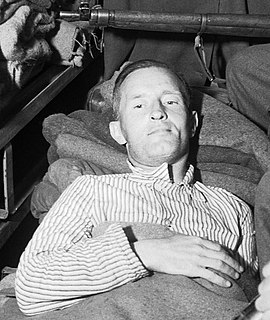A Quote by William Joyce
I would gladly say 'Heil Hitler!' and at once part company with him, realizing what a pitiable insult it is to such a great man to try to flatter him with such an imitation which he has always disdained. His way is for Germany, ours is for Britain; let us tread our paths with mutual respect, which is rarely increased by borrowing.
Related Quotes
I have always said that if Great Britain were defeated in war I hoped we should find a Hitler to lead us back to our rightful position among the nations. I am sorry, however, that he has not been mellowed by the great success that has attended him. The whole world would rejoice to see the Hitler of peace and tolerance, and nothing would adorn his name in world history so much as acts of magnanimity and of mercy and of pity to the forlorn and friendless, to the weak and poor.... Let this great man search his own heart and conscience before he accuses anyone of being a warmonger.
Man is appealed to be guided in his acts, not merely by love, which is always personal, or at best tribal, but by his perception of his oneness with each human being. In the practice of mutual aid, which we can re-trace to the earliest beginnings of evolution, we thus find the positive and undoubted origin of our ethical conceptions; and we can affirm that in the ethical progress of man, mutual support- not mutual struggle- has had the leading part.
The mockery made him feel an outsider; and feeling an outsider he behaved like one, which increased the prejudice against him and intensified the contempt and hostility aroused by his physical defects. Which in turn increased his sense of being alien and alone. A chronic fear of being slighted made him avoid his equals, made him stand, where his inferiors were concerned, self-consciously on his dignity.
Glad and merry and sweet is the blessed and lovely demeanour of our Lord towards our souls, for he saw us always living in love-longing, and he wants our souls to be gladly disposed toward him . . . by his grace he lifts up and will draw our outer disposition to our inward, and will make us all at unity with him, and each of us with others in the true, lasting joy which is Jesus.
David Lloyd George had been to Germany, and been so dazzled by the Führer that he compared him to George Washington. Hitler was a 'born leader', declared the befuddled former British Prime Minister. He wished that Britain had 'a man of his supreme quality at the head of affairs in our country today'. This from the hero of the First World War! The man who had led Britain to victory over the Kaiser!
My conception of the audience is of a public each member of which is carrying about with him what he thinks is an anxiety, or a hope, or a preoccupation which is his alone and isolates him from mankind and in this respect at least the function of a play is to reveal him to himself so that he may touch others by virtue of the revelation of his mutuality with them. If only for this reason I regard the theater as a serious business, one that makes or should make man more human, which is to say, less alone.
There is a time in every man's education when he arrives at the conviction that envy is ignorance; that imitation is suicide; that he must take himself for better, for worse, as his portion; that though the wide universe is full of good, no kernel of nourishing corn can come to him but through his toil bestowed on that plot of ground which is given to him to till. The power which resides in him is new in nature, and none but he knows what that is which he can do, nor does he know until he has tried.
That part of Christ's nature which was profoundly human helps us to understand him and love him and to pursue his Passion as though it were our own. If he had not within him this warm human element, he would never be able to touch our hearts with such assurance and tenderness; he would not be able to become a model for our lives.
Steve held us to a high standard. He told us he was going to when we first met him at the USA camp. He's been a great leader. I mean, the guy always keeps his composure. He has an amazing mind for the game, and man, Steve, I'm just proud of him. The way he's balanced everybody and let us know what our roles are, he's been great for us. Him and the whole coaching staff. We all deserve this together, we work so hard.
After visiting these places, you can easily understand how that within a few years Hitler will emerge from the hatred that surrounds him now as one of the most significant figures who ever lived. He had boundless ambition for his country which rendered him a menace to the peace of the world, but he had a mystery about him in the way that he lived and in the manner of his death that will live and grow after him. He had in him the stuff of which legends are made.
Human life is thus only a perpetual illusion; men deceive and flatter each other. No one speaks of us in our presence as he does of us in our absence. Human society is founded on mutual deceit; few friendships would endure if each knew what his friend said of him in his absence, although he then spoke in sincerity and without passion.
The pitch to which he was aroused was tremendous. All the fighting blood of his breed was up in him and surging through him. This was living., though he did not know it. He was realizing his own meaning in the world; he was doing that for which he was made.... He was justifying his existence, than which life can do no greater; for life achieves its summit when it does to the uttermost that which it was equipped to do.
There is no man ... however wise, who has not at some period of his youth said things, or lived a life, the memory of which is so unpleasant to him that he would gladly expunge it. And yet he ought not entirely to regret it, because he cannot be certain that he has indeed become a wise man -- so far as it is possible for any of us to be wise -- unless he has passed through all the fatuous or unwholesome incarnations by which that ultimate stage must be preceded.


































